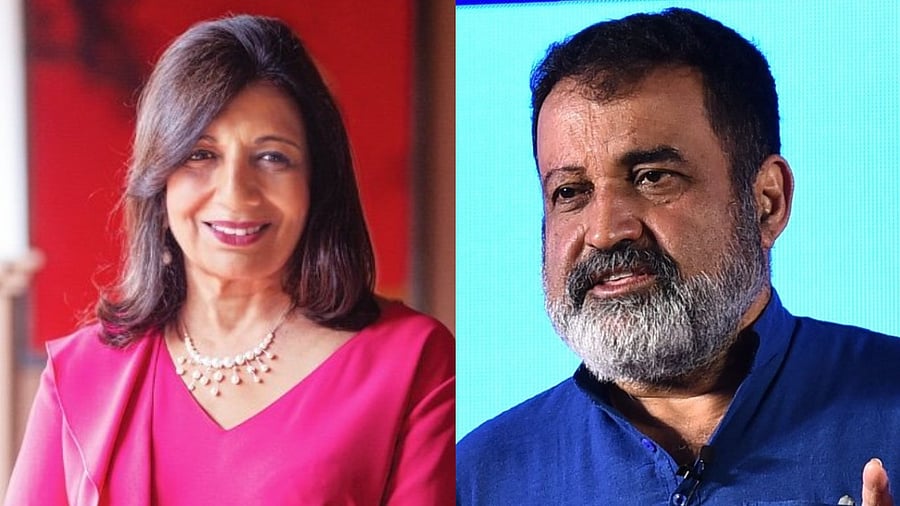
Biocon founder Kiran Mazumdar-Shaw and former Infosys CFO Mohandas Pai
Credit: DH File Photos
An online war of words has begun in Karnataka between Kannada activist Arun Javagal and industry leaders such as Kiran Mazumdar-Shaw and T V Mohandas Pai, reigniting a debate over local identity, job rights, and Bengaluru's strained infrastructure. The ongoing debate also highlights deep divisions over the city’s rapid growth and cultural priorities.
It all started with social media posts by Shaw and Pai highlighting the city's "poor" roads and garbage management, and seeking urgent action and accountability from the authorities. The posts drew sharp reactions from political leaders, with Deputy Chief Minister D K Shivakumar accusing the industry leaders of pushing "personal agendas" and selectively targeting the Congress government while ignoring similar issues under previous BJP-JD(S) administrations.
Clarifying their stance, Shaw said both Pai and she had consistently raised concerns over infrastructure during the previous regimes, and all they wanted was a clean-up and restoration of roads for the city's sake.
Javagal, a software engineer and activist affiliated with groups such as Karnataka Rakshana Vedike and Kannada Grahakara Koota, escalated the debate into a broader cultural and political battle. In a series of posts, Javagal, known for supporting Kannada language rights and local job priorities, accused Shaw and Pai of being "anti-Kannada" and "Delhi agents" who undermine Karnataka’s interests by opposing policies such as the one that proposed 50 to 75% job quota for Kannadigas in the private sector.
He termed their criticism of Bengaluru’s infrastructure as a distraction from their alleged resistance to pro-local measures. “Kannadiga CM Siddaramaiah went silent on job priorities after objections from Gujarati Kiran Shaw and Konkani Mohandas Pai,” he wrote, adding, “Job creation is appreciated, but it doesn’t entitle you to block Kannadiga incentives.”
While Shaw is a Bengaluru-born Gujarati-origin entrepreneur, Pai has his roots in Udupi. While opposing the job quota proposal, Shaw had said that highly skilled recruitment must be exempted from the Karnataka government's decision mandating reservation for Kannadigas in private firms. Pai had termed the government move "draconian" and "unconstitutional".
In response to a Javagal's post, Shaw said she is 'a proud mannina magalu' (daughter of the soil), emphasising her connection to Bengaluru, where her company is also based.
Talking for both Shaw and himself, Pai said, "We both were born here... We have lived here all our lives and helped build our city. These kind of hate-filled, bigoted narratives only show the sick mind of people who make such narratives. If these sick people call us outsiders, then who is a Bangalorean?"
The development highlights a longstanding debate in Karnataka over migration, economic growth, and cultural identity. While Bengaluru's development into an information technology and biotech hub saw its population and economic activity surge, the city's infrastructure remains strained. This has fueled resentment among some locals who argue that non-Kannadigas dominate high-paying jobs and influence State policies.
While speaking to DH, Javagal sought to know whose interests the industrialists are trying to protect when they raise issues such as taxes and accountability. "For every Rs 100 collected as corporate and income tax, Rs 59 goes to the Union government after vertical devolution, and only about Rs 1.50 reaches the Karnataka government under horizontal devolution of taxes as per the 15th Finance Commission recommendations. When such is the case, the local civic body gets no share in it. The need of the hour is the local civic body getting a share in the devolution of taxes," he said.
"When the lion's share of the corporate tax and income tax goes to the Centre, why are these industrialists seeking accountability from the State government, whose policies they oppose?" he said, referring to the opposition the State government faced for its move on job reservation for Kannadigas.
"When MNCs obey the local law and framework of the government, why are some industrialists with an ultra-nationalist mindset opposing reservation in jobs for Kannadigas and preferring cheap migrant labour?" he sought to know.
He said the industry leaders who are part of various government committees "represent people and control the politics of Bengaluru indirectly". "Why can't they raise issues such as delay in completing the suburban rail project and delay in Central funding for the airport metro line with the Union government?"
Reiterating the demand for giving priority for local people in jobs, Javagal said, "This will improve the economic status of local people. The loss the State government suffers owing to the unjust devolution of taxes can be compensated in a way when local people get jobs. This will also reduce the strain on infrastructure as the number of economic migrants will come down."